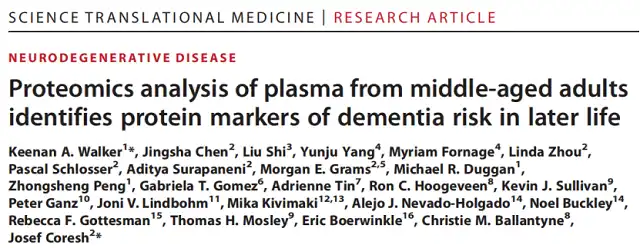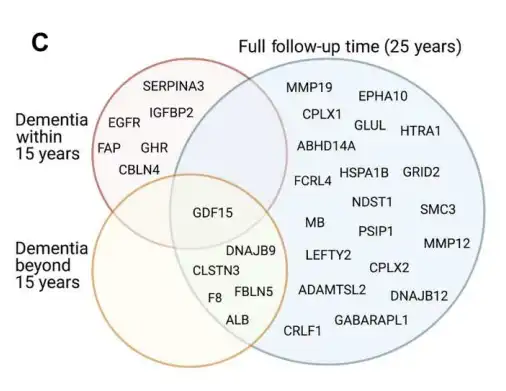32 proteins related to dementia in the blood of middle-aged people!
- Normal Liver Cells Found to Promote Cancer Metastasis to the Liver
- Nearly 80% Complete Remission: Breakthrough in ADC Anti-Tumor Treatment
- Vaccination Against Common Diseases May Prevent Dementia!
- New Alzheimer’s Disease (AD) Diagnosis and Staging Criteria
- Breakthrough in Alzheimer’s Disease: New Nasal Spray Halts Cognitive Decline by Targeting Toxic Protein
- Can the Tap Water at the Paris Olympics be Drunk Directly?
32 proteins related to dementia in the blood of middle-aged people!
- Should China be held legally responsible for the US’s $18 trillion COVID losses?
- CT Radiation Exposure Linked to Blood Cancer in Children and Adolescents
- FDA has mandated a top-level black box warning for all marketed CAR-T therapies
- Can people with high blood pressure eat peanuts?
- What is the difference between dopamine and dobutamine?
- How long can the patient live after heart stent surgery?
32 proteins related to dementia in the blood of middle-aged people!
“Science Translational Medicine”: Based on 25 years of data, scientists found 32 proteins related to dementia in the blood of middle-aged people!
Genome-wide association studies of Alzheimer’s disease (AD) have revealed that its biological processes are complex and not limited to the accumulation of amyloid-β (Aβ) and tau proteins.
Systemic factors and biological processes outside the central nervous system may also affect dementia and AD risk.
Proteins, as systemic circulating factors, may be drivers of complex central nervous system diseases, and researchers have been searching for markers in plasma that can represent the progression of pathology.
However, current large-scale proteomic analyzes of dementia focus on older adults and use a cross-sectional design, making it difficult to account for relevant changes in proteins during long-term preclinical disease processes.
In this study, Keenan A. Walker of the Behavioral Neuroscience Laboratory of the National Institute on Aging and his research team conducted a proteomic study on population data spanning 25 years and found 32 dementia- related Plasma proteins, related to biological functions such as protein homeostasis, immunity, synaptic function and extracellular matrix .
The researchers also identified protein network signatures associated with dementia risk at different stages of pre-disease development .
The research was published in Science Translational Medicine.

The research data came from the Atherosclerosis Risk Population Study (ARIC). A total of 10,981 participants were included.
The baseline age was 60 years old, and 54% were women. After 25 years of follow-up, 1,874 participants were diagnosed with dementia before the end of the follow-up.
Of the 4877 plasma protein levels measured at baseline, 452 were significantly associated with dementia risk 25 years later.
After adjusting for associated factors, 26 proteins remained significantly associated with dementia risk. Among them, GDF15 is involved in metabolism and immune regulation, and has the strongest association with dementia risk. Play a role in blood coagulation .
Restricting protein collection age to participants aged 40-50 years (n = 5285), a total of 32 proteins associated with dementia risk were identified.
These proteins have been associated with brain Aβ positivity, elevated CSF p-tau levels, neurodegeneration, and neuroinflammation.
The expression of many of these proteins was also found to be significantly higher in the brains of AD patients than in the control group.

Protein classes associated with short-term and long-term dementia risk
In order to clarify the relationship between protein types and dementia risk at different stages, the researchers defined the occurrence of dementia within 15 years after protein measurement as short-term dementia risk (neuropathological changes may have existed) , and the occurrence of dementia 15 years later was defined as long-term dementia risk.
The protein classes with the highest associations differed between periods , but GDF15 remained robustly associated with dementia risk throughout follow-up .
Based on these protein features, the researchers divided them into 19 non-overlapping protein modules. A protein module significantly associated with near-term dementia risk, rich in complement and coagulation proteins, was enriched in liver tissue .
Protein modules significantly associated with long-term dementia risk are enriched in proteins such as JAK-STAT signaling pathway, cytokine signaling pathway, helper T cell 1 (TH1) and TH2 cell differentiation, and were shown to be enriched in multiple tissues such as the appendix, lymph nodes, and salivary glands .
The results show changes in the immune signature during dementia progression, and different biological mechanisms may be involved in the early and late preclinical stages of AD.

Potential relationship between dementia-associated proteins and non-AD phenotypes
Next, the researchers selected 13 proteins to make an all-cause dementia prediction model with an area under the curve (AUC) of 0.66.
Correspondingly, the AUC of the predictive model consisting of demographic factors, APOEϵ4, and cardiovascular risk factors was 0.77. Adding the candidate protein to the demographic/cardiovascular risk factor model improved the predictive accuracy with an AUC of 0.78 .
Overall, the study identified 32 plasma proteins in middle-aged individuals that were strongly associated with dementia risk in subsequent decades.
These proteins are mainly involved in four biological processes of protein homeostasis, immunity, synaptic function and extracellular matrix organization.
And with age and disease progression, peripheral biological pathways associated with subsequent dementia risk are altered.
32 proteins related to dementia in the blood of middle-aged people!
(source:internet, reference only)
Disclaimer of medicaltrend.org
Important Note: The information provided is for informational purposes only and should not be considered as medical advice.



